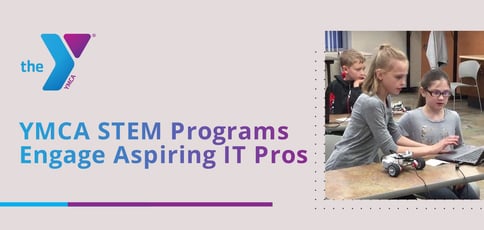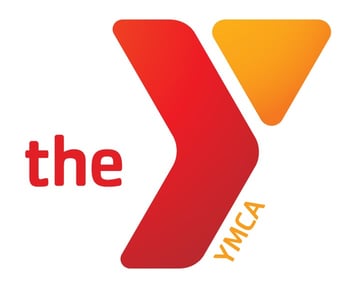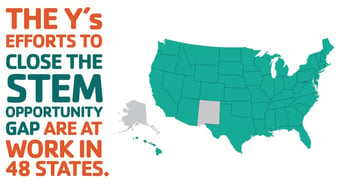
TL; DR: The YMCA aims to spark interest in careers of the future by offering year-round youth STEM programs at more than 1,000 locations nationwide. The programs teach kids valuable lessons about technology and help them develop critical thinking and problem-solving skills. The YMCA also actively promotes equity in its STEM programs while making them accessible to kids of every demographic and income level. Those lessons prepare children for high-demand jobs in critical STEM fields, including engineering and systems administration.
As a kid, I spent many memorable summer days at my local YMCA. I would meet a few of my friends, and we would talk, laugh, and play while also getting a healthy dose of exercise. I had plenty of fun, but I also learned a few life lessons without even realizing it.
I learned teamwork by working smarter to beat the older kids at basketball. Mediating disagreements between my friends on the racquetball court taught me valuable problem-solving skills. I confronted failure when I started lifting weights, and I gained confidence when I won the cannonball contest at the pool.
Times have certainly changed for kids since then. Smartphones, the internet, and gaming servers have all come along to compete for their attention. But in this new environment, the YMCA is still committed to dispensing the same lessons I learned as a kid — with a modern twist.

YMCA youth STEM programs are open to kids at 1,000 locations nationwide.
Today, the YMCA offers STEM programs that introduce youth participants to science, technology, engineering, and math concepts to help them later in life. Jobs in STEM fields are already in high demand, but that will increase in the next decade as the digital world expands.
Counselors at 1,000 YMCA locations around the country work with kids to encourage their interest in STEM through activities that help build a wide range of skills. And many of those lessons have applications well beyond the tasks participants accomplish through the programs.
Learning how to work as a team, deal with failure constructively, and solve problems are skills that kids can put into practice long before deciding on a career path. And the technical knowledge they gain can give them a leg up if they choose to pursue jobs in STEM fields.
STEM Imparts Valuable Critical Thinking and Problem-Solving Skills
YMCA STEM programs offer more than just technical knowledge; they also provide kids with skills applicable to any field or industry. That includes fostering reasoning, reflection, critical thinking, and problem-solving abilities.
Those skills are vital in IT fields, including server management or game development, that require teamwork and testing. Joey B. was a STEM program participant who was interested in taking his art to the next level by designing his own games.
“At a young age, I was introduced to this program, which taught me a lot about technology,” Joey said in a YouTube video on his STEM experience at his YMCA in Long Beach, California. “To be a game designer or 3D modeler, it takes a lot of dedication … The YMCA really helped me because they showed me programs specifically for game design.”
While Joey may find those technical skills invaluable if he chooses a future in gaming, other lessons would allow him to thrive in a collaborative environment. That includes teams working on art, storylines, and ensuring a high-quality experience on the server side.
Many of the YMCA’s STEM programs have built-in collaboration and troubleshooting elements while they also deal with the critical subject of failure. In the world of technology, failure is relatively common, and learning how to pivot, recalibrate, and try again is essential to the process.
The YMCA offers a springboard to potential STEM career opportunities by fostering interest in learning those skills. And it designs activities and programs for kids from kindergarten through 8th grade.
Accessible Programs Designed to Encourage Learning from a Young Age
While a kindergartener may not dream about becoming an IT specialist or server network administrator, that doesn’t mean they can’t open a path early on.
The YMCA’s STEM programs take participants from kindergarten through 8th grade through various multi-step group projects designed to engage them with STEM principles. Programs may differ depending on the location and expertise of counselors working at each local YMCA. Still, the organization offers a glimpse of the types of activities participants can expect on its website.
The Chromatography Mysteries activity encourages kids from kindergarten through 6th grade to think about what goes into making the colors they see in markers and crayons. Rather than running a Google search on a mobile device, they engage in discussions, ask questions, and experiment with colors.
According to the instruction sheet, the activity is designed “to encourage youth to think creatively and come to conclusions based on questioning and experimentation.”

STEM activities include steps that help participants work through solving a problem together.
The Parachute Challenge tests the ingenuity and design ability of kids in kindergarten through 8th grade. The goal is for teams, all using the same materials, to design a parachute that stays in the air the longest.
Teams must first investigate the problem, probing the dynamics of a parachute and what makes it work. Then, they design a version that will accomplish the same task based on the materials they have.
Some STEM activities involve more questioning and research, while others add design and technical concepts into the mix. But each one fosters a sense of teamwork and allows youth participants to brainstorm and solve problems together.
Promoting Equity to Ensure Widespread Access to Knowledge
According to Girls Who Code, women made up 37% of the computer science workforce in 1995, but that number is projected to fall to 22% by 2022. Closing the gender gap in computer science won’t be easy, but the YMCA believes it will be worth it.
YMCA STEM programs are built with gender equity in mind. Program leaders intentionally focus on encouraging young girls to participate, which can serve to counteract institutional patterns.
That could be as simple as counselors calling on girls more often to help others in the class get used to hearing their voices, which can normalize the interactions and also teach more dominant boys how to share.

The YMCA works to make programs accessible to close the gender, ethnic, and income gaps in STEM learning.
Making STEM lessons more gender-inclusive can lead to other positive results for girls. Critical thinking and problem-solving skills can help with any career, including securing lucrative positions in competitive tech fields. Some of the highest paying jobs in STEM fields include many that deal with technology, including data analysis, server network administration, and IT, according to Indeed.
But gender equity isn’t the only social balance the YMCA aims for. It also wants to close the ethnic and income disparities that exist in STEM learning. A report from the National Science Board shows that a little over 13% of the science and engineering labor force is African American, Hispanic, or Native American. That disparity is often attributed to a lack of access in those communities.
The YMCA’s STEM programs help fight disparities by ensuring its educational resources are available to people of every demographic and income level.
YMCA: Offering Tools That Will Help Children Build the Future
Kids can still learn many lessons at the YMCA through basketball, racquetball, weightlifting, and swimming. But the organization’s STEM programs make critical thinking, problem-solving, and technology skills more widely accessible to everyone.
The programs put youth participants on a stable path to seek out STEM careers in the future. And the YMCA is committed to ensuring that young girls find the same educational opportunities, opening doors that are often closed by societal patterns.
Most importantly, kids who participate in the YMCA’s year-round STEM programs learn how to work together to solve problems. And teaching unity to achieve a common goal is more than a STEM lesson; it is one that will resonate through the rest of their lives.
HostingAdvice.com is a free online resource that offers valuable content and comparison services to users. To keep this resource 100% free, we receive compensation from many of the offers listed on the site. Along with key review factors, this compensation may impact how and where products appear across the site (including, for example, the order in which they appear). HostingAdvice.com does not include the entire universe of available offers. Editorial opinions expressed on the site are strictly our own and are not provided, endorsed, or approved by advertisers.
Our site is committed to publishing independent, accurate content guided by strict editorial guidelines. Before articles and reviews are published on our site, they undergo a thorough review process performed by a team of independent editors and subject-matter experts to ensure the content’s accuracy, timeliness, and impartiality. Our editorial team is separate and independent of our site’s advertisers, and the opinions they express on our site are their own. To read more about our team members and their editorial backgrounds, please visit our site’s About page.



